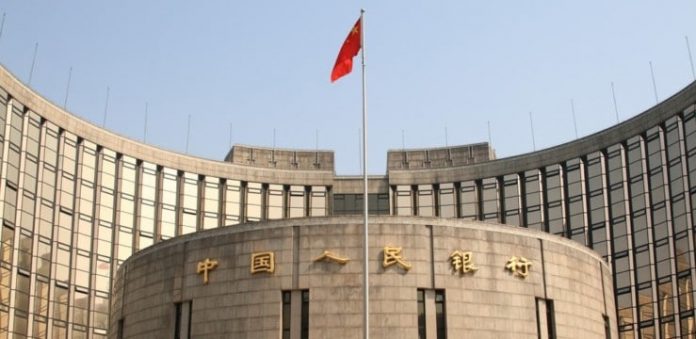BEIJING: China’s central bank on Sunday announced a steep cut in the level of cash that banks must hold as reserves, stepping up moves to lower financing costs and spur growth amid concerns over the economic drag from an escalating trade dispute with the United States.
The reserve requirement cut, the fourth by the People’s Bank of China (PBOC) this year, comes as Beijing has pledged to expedite plans to invest billions of dollars in infrastructure projects as the economy shows signs of cooling further, with investment growth slowing to a record low.
Reserve requirement ratios (RRRs) – currently 15.5 percent for large commercial lenders and 13.5 percent for smaller banks – would be cut by 100 basis points effective Oct. 15, the PBOC said, matching a similar-sized move in April. Economists predicted further cuts ahead.
Beijing has stepped up liquidity support across the financial system this year as policymakers have focused on calming fears of capital outflows and sought to soothe battered markets even as anxiety grows that a heated trade war with the United States could deal a damaging blow to the broader economy.
China’s yuan currency has faced strong selling pressure this year, losing over 8 per cent between March and August at the height of market worries, though it has since cut losses as authorities stepped up support.
Sunday’s move will inject a net 750 billion yuan ($109.2 billion) in cash into the banking system by releasing a total of 1.2 trillion yuan in liquidity, with 450 billion yuan of that to offset maturing medium-term lending facility (MLF) loans.
The RRR cut, announced on the last day of China’s week-long National Day holiday, indicates that the central bank is worried about the impact of “external shocks” to markets such as a speech last week by U.S. Vice President Mike Pence, said Zhang Yi, chief economist at Zhonghai Shengrong Capital Management.
Pence intensified Washington’s pressure campaign against Beijing on Thursday by accusing China of “malign” efforts to undermine U.S. President Donald Trump ahead of next month’s congressional elections and reckless military actions in the South China Sea.
Pence’s speech marked a sharpened U.S. approach toward China, going beyond the bitter trade war between the world’s two biggest economies, which has magnified concerns about the outlook for China’s economy.
“Very timely”
Weakening exports were already a drag on growth in the first half of the year after giving an added boost to the economy last year, highlighting the need for sustained strength in domestic demand if significant new U.S. tariffs are imposed.
The “very timely” RRR cut is big enough to help boost confidence in the economy, said Xu Hongcai, deputy chief economist at the China Center for International Economic Exchanges, a Beijing think tank.
“The trade war’s impact on the economy is showing. There is room for further reductions and I expect another 1 percentage point cut by the year-end,” Xu added.
China would also adopt a more proactive fiscal policy, including potential tax cuts on a larger scale, to safeguard economic growth, state-run Xinhua News Agency reported later on Sunday, citing Finance Minister Liu Kun.
Total tax cuts for the year are expected to exceed 1.3 trillion yuan, according to Liu.
“Some regions and companies have been hit (by trade frictions), but China has the ability to minimize the impact”, Liu was quoted as saying. The government has taken measures to help companies impacted by the trade war, he added.
The central bank said on Sunday it would continue to take necessary measures to stabilize market expectations while maintaining a prudent and neutral monetary policy.
The PBOC would “maintain reasonably ample liquidity to drive the reasonable growth of monetary credit and social financing scale”, it said.
The RRR cut would not create depreciation pressure on the yuan, the PBOC said, adding it would keep the foreign exchange markets stable.




